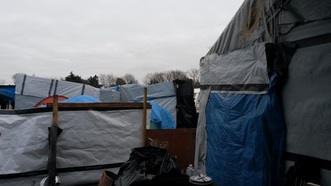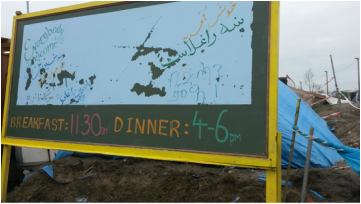THREE STORIES
One
Adam has a second name, which means Melody – ‘but in English that is a girl’s name I think?’ He implies this name was a whimsical idea of his mother, that he was her ‘flowering’. From Iran, he says, his father from Dubai and his mother from Tehran – or perhaps it is the other way round? Although communities have grown up around particular countries of origin – Iran, Afghanistan, Pakistan, Syria, Sudan, Eritrea – and residents work hard to preserve their culture, identity is under threat when life is reduced to its most basic: the struggle to stay alive.
He has some things to say about living in The Jungle. He says that the people who live there are 75 parts ‘normal’, which he equates with good – ‘you, me, 75 good, normal’. The other 25 he describes as ‘mafia’ – bad people, who carry guns and knives, pick fights, make the place frightening and dangerous after dark.
He also has views on religion and its needless conflicts: two paths, he demonstrates in the air with his hands, two parallel roads, the Quran, and the Christian path – his name for this seems to relate to ‘mass’, or perhaps ‘Messiah’ – to the same goal: peace. He brings his hands together in that universal image of hands clasping across the world. He is articulate, courteous, handsome, funny, obviously both intelligent and educated. What kind of a world is this, where someone like Adam is reduced to living like this?
Two
Three

He invites four volunteers, who happen to be outside waiting for a lift, in for tea. He does this without words (apart from ‘eggs’ and ‘tomatoes’). His invitation is made gracefully, and graciously, with his hands, but it is also insistent: there is no possibility of refusing. He tries to learn names, but gives up, laughing apologetically. He settles his visitors on the benches and disappears behind a partition wall, where he must have a stove. In ten or fifteen minutes he reappears with a frying pan of scrambled eggs. He empties an orange box of clean crockery and upturns it on the fire chimney to make a table, on which he puts the pan. A tiny folding stool makes a second table for a bag of sliced bread: use the bread as a spoon, he mimes. The eggs are mixed with tomato and onion and lots of salt, and are delicious. He brings a bottle of water and a cup. Later, there is tea, and then more tea, and photographs. His guests leave, to return to their homes.
PHOTOSHOOT
I heard… volunteers, you are not special, you are normal: you put the humanity in humanity thank you hello-how-are-you I am from Iran/Tehran/Afghanistan thank you very much ‘Dunkirk is the worst refugee camp I have seen anywhere in the world’ (Jeremy Corbyn) two syrians stabbed my name is Muhammad/Adam/Saber thank you laughter singing hammering music the mellifluous sound of chatter in Arabic twenty seconds of flute thank you so much
I smelt… well, imagine
I tasted… lentil lemon dahl lamb balls cous cous bread and jam scrambled eggs three kinds of chai and a snickers bar on the way home
I touched... the button to take the last photo in my mind as we waited for our lift opposite the Ashram Kitchen. A group of men waited in line. In the foreground, three boys walked towards and away, one wrapped head and shoulders in a red and white blanket. There were a few inventive hats. Behind them, the ‘rooftops’ of the temporary city. In front, a boy, twelve, fourteen, perhaps, with a slightly older man – a brother? uncle? father? – let’s say brother. The brother had his arm round the boy, chucked him playfully under the chin. It wasn’t clear what it was about, but it looked like a tender, teasing moment. Both were smiling. Another boy collected the football lying in the mud in front of us and kicked it in front of him, on his way home.
AFTERWARDS

 RSS Feed
RSS Feed
